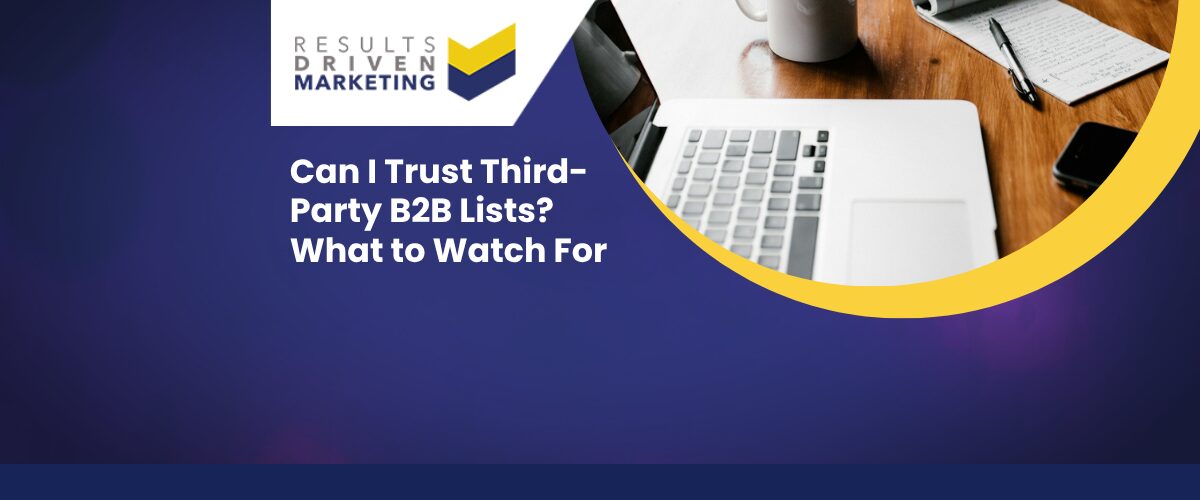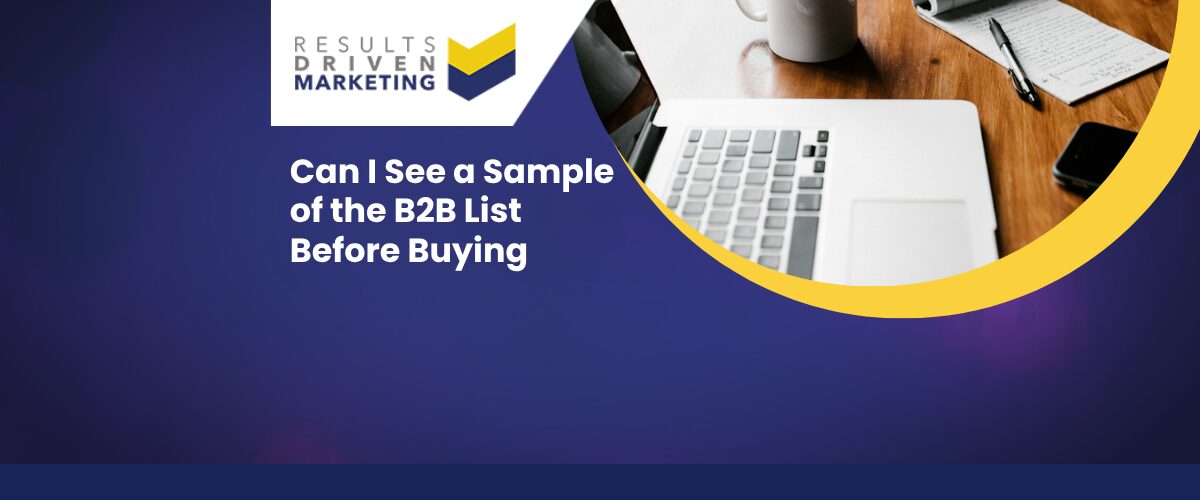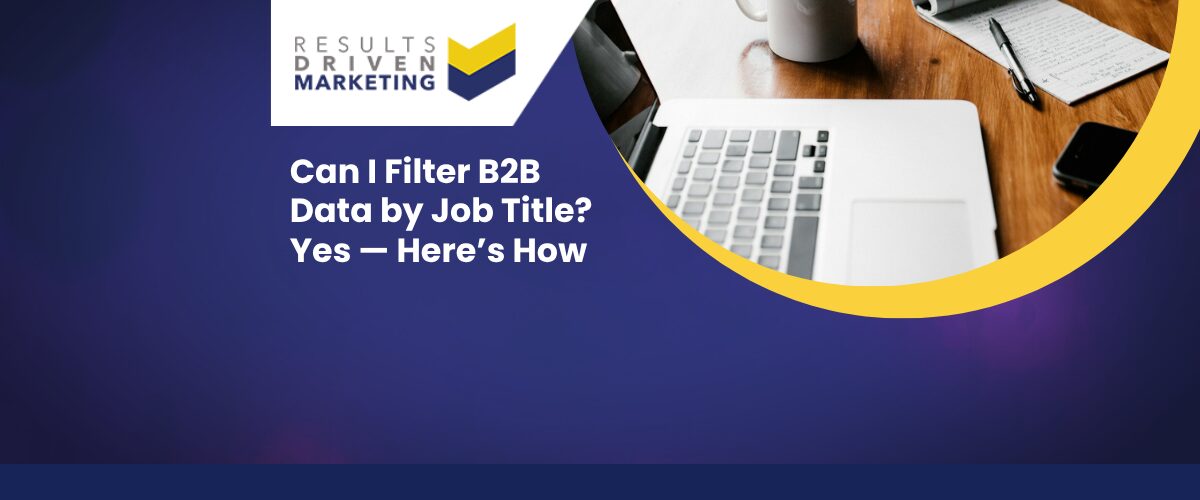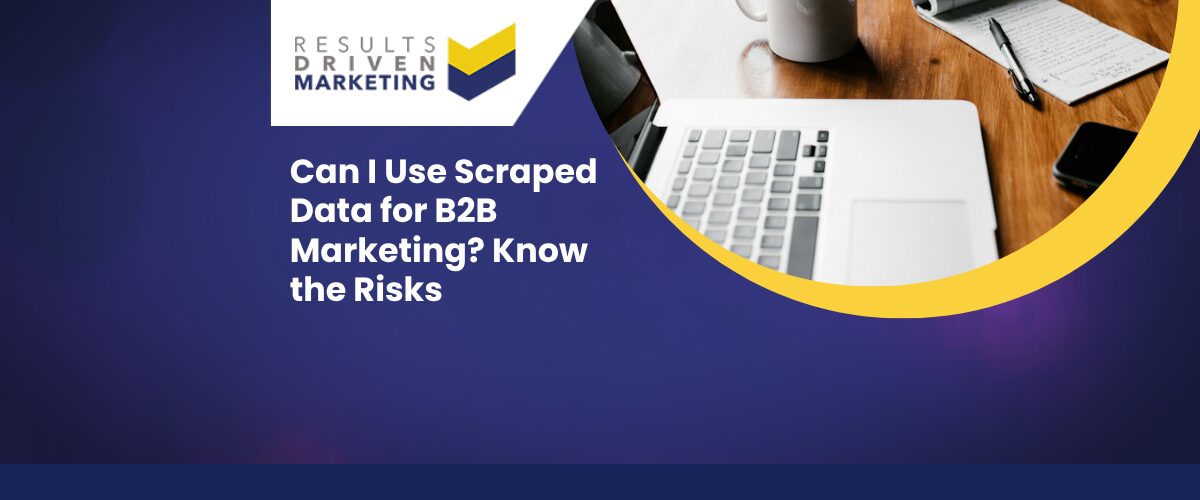
Can I Trust Third-Party B2B Lists? What to Watch For
Can I trust third-party B2B lists? It’s a common concern — especially for SME business owners and marketers who rely on purchased data to fuel their sales and marketing campaigns. When time is tight and targets are looming, buying a list from an external provider sounds like a fast fix. But the wrong list can do more harm than good.
Poor data quality. Legal issues. Spam complaints. Wasted time and money.
Not all list providers are created equal, and not all data is worth using. Some will give you access to high-quality, GDPR-aware, well-segmented contacts. Others? You’re left with irrelevant, outdated info that risks your sender reputation — or worse, lands you in legal hot water.
In this article, we’ll show you how to separate trustworthy data suppliers from risky ones. You’ll learn what to look for, what to avoid, and how to choose B2B data that drives real results — without cutting corners.
Table of contents:
What Are Third-Party B2B Lists?
Third-party B2B lists are contact databases provided by external companies that specialise in collecting and selling business data. These lists can be a valuable resource — if sourced and used properly.
Definition and Common Sources
Third-party B2B lists typically include:
-
Business name and address
-
Contact name and job title
-
Email addresses and phone numbers
-
Company size, sector, turnover, and geography
They’re usually built using:
-
Public records and Companies House data
-
Online business directories
-
Partnerships with data aggregators
-
Licensing from reputable commercial sources
Why Businesses Use Them
For many SMEs, purchasing third-party data is a practical shortcut:
-
Speeds up prospecting and outreach
-
Helps test new markets without internal data collection
-
Supports sales and marketing alignment by delivering ready-to-use contacts
But the benefits only materialise if the data is accurate, relevant, and compliant — and that depends entirely on who you buy it from.
The Risks of Low-Quality or Non-Compliant Lists
Not all third-party data is created equal. If you’re working with a provider who cuts corners, the risks to your campaign — and your business — can be significant.
Poor Accuracy and Targeting
Low-quality lists often contain:
-
Outdated contacts or job roles
-
Irrelevant industries or locations
-
Duplicated or incomplete records
This means you spend time and money marketing to the wrong people — reducing ROI and damaging brand perception.
Legal and Compliance Risks (GDPR & PECR)
If the data isn’t collected and managed properly, you could breach:
-
GDPR — by lacking a lawful basis to process personal data
-
PECR — by emailing or calling contacts without consent or proper opt-outs
This can lead to complaints, ICO investigations, or worse — fines and email platform bans.
Damage to Campaign Performance
Poor data = poor results. You’re likely to see:
-
High bounce rates and spam complaints
-
Low open and response rates
-
Declining sender reputation with platforms like Gmail and Outlook
And once your domain gets flagged, it’s an uphill battle to recover.
How to Evaluate a Third-Party List Provider
Choosing the right data supplier can make or break your campaign. Here’s how to separate the credible from the questionable.
Key Questions to Ask
Before buying, ask the provider:
-
Where is your data sourced from?
-
How often is the data updated?
-
Can I filter by sector, job title, size, location?
-
Is your data GDPR and PECR aware?
Warning Signs to Avoid
Be cautious if:
-
They make big promises like “100% deliverability”
-
They can’t explain where the data came from or how it’s maintained
-
Pricing is vague or overly cheap
-
They dodge questions about compliance
A trustworthy supplier will welcome your questions — because they’ve got nothing to hide.
What Good Third-Party Data Should Include
When you’re buying B2B data, it’s not just about quantity — it’s about quality, accuracy, and relevance.
Minimum Data Fields
Every record should include:
-
Business name and postal address
-
Contact name and job title
-
Work email address or phone number
-
Company size, sector, and location
Targeting Flexibility
Good data providers let you filter contacts by:
-
Industry/SIC code
-
Job function or seniority level
-
Geography (postcode, region, nationwide)
-
Company size or turnover
CTPS-Checked for Telemarketing
If you plan to call contacts, UK law requires you to check against the Corporate Telephone Preference Service (CTPS). Quality suppliers include CTPS screening as standard — saving you time and helping you stay compliant.
Why Choose Results Driven Marketing
At Results Driven Marketing, we don’t just sell lists — we help UK SMEs connect with real decision-makers, faster and more effectively.
Here’s what makes us different:
-
700,000+ Monthly Updates from trusted UK sources
-
2,000+ Industry Sectors Covered with real filters — not fluff
-
GDPR and PECR Aware, with CTPS checks for phone campaigns
-
Tailored Targeting, Delivered Fast — within 24 hours
-
No Fluff. Just Honest Advice.
When you work with us, you’re not just buying data. You’re gaining a partner who’s invested in your success.
Final Thoughts: Trust the Source, Not Just the List
Can I trust third-party B2B lists? The short answer: only if you trust the source.
A high-quality B2B list can power your outreach, drive new leads, and save your team hours of work. But a poor-quality list can do just the opposite — costing you time, money, and reputation.
The difference comes down to more than just the data itself. It’s about who you buy from, how the data is sourced, and whether they stand behind their product. If you’re serious about getting results — and staying compliant — shortcuts won’t cut it.
Trustworthy data isn’t the cheapest option. But it’s the most cost-effective in the long run.
Want Trusted B2B Data That Works?
If you’re looking for reliable, accurate B2B data you can actually use — without the legal headaches or wasted time — we’re ready to help.
At Results Driven Marketing, we specialise in supplying UK SMEs with fast, tailored, and compliant data lists for email, phone, and direct mail campaigns.
-
Free Data Counts & Advice
-
GDPR-Aware and CTPS-Checked
-
Fast Turnaround, Real Support
📞 Call us on 0191 406 6399 or Contact Us
Or check out our email lists to get started today.
Results Driven Marketing
B2B Data Lists for Email, Telemarketing & Direct Mail
Serving UK SMEs | Cobalt Business Exchange, Newcastle
📞 0191 406 6399 | 🌐 rdmarketing.co.uk




